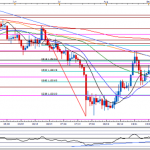There are three developments today, which while not driving the market, are important for many investors. The first are comments from German Finance Minister Schaeuble and EC President Juncker. The second is an important development in Poland. The third are growing problems in Greece.

Schaeuble is formally acknowledging what investors have known for some time. The Schengen Agreement, which opens the internal borders in Europe, is at risk. This agreement pre-dates EMU itself. So how serious is it if there are internal border checks? Juncker, not known for mincing words, said today that without Schengen, there is no point to the euro.
This points to the risk of an existential crisis in Europe that would make last summer’s anxiety over Greece seem like child’s play. The poor growth, high unemployment that Europe has largely been unable to resolve (admittedly with a few exceptions like Germany) only aggravates base instincts and latent xenophobia. The escalation of terrorism contributes to the desire for more internal border checks, but the effectiveness continues to be the subject of much debate.
Recognizing the central place of political will at the very foundation of EMU allowed us to correctly anticipate that Greece would remain within the union in both 2011-12 and 2015. The same insight, however, makes the potential dissolution of the Schengen Agreement even more significant.
II
Since the election of the Law and Justice Party, the country has moved in an illiberal direction. Today is the anniversary of the lifting of the Swiss franc cap. Many Polish mortgages were taken in Swiss francs. The issue is how the cost should be distributed. Today, Poland’s President is proposed that the mortgages are repaid at a ‘fair price” which means less than market prices.
The example used is that in 2007 the franc/zloty cross was around 2.27. At the end of last year, it was 3.91. A fair price, says the President, is 2.80. This would obviously forces the lenders to take the haircut, and hence, their stocks are under pressure, and the zloty itself is at new four year lows vs. the euro. There is also fear that S&P will cut its outlook for Poland’s credit rating.











Leave A Comment